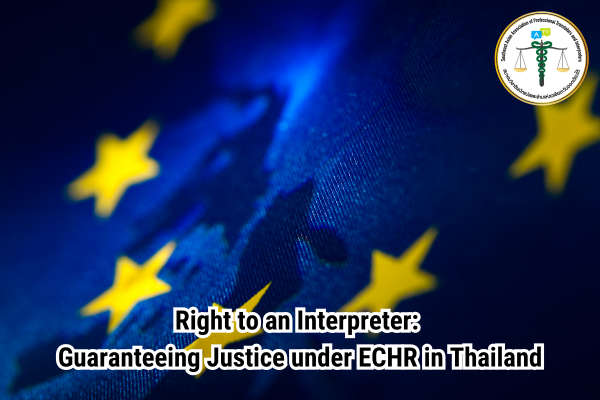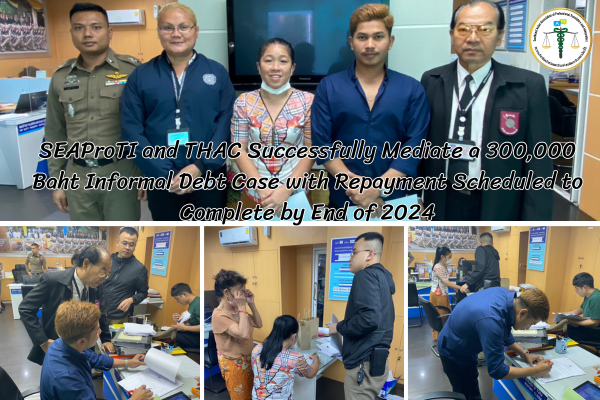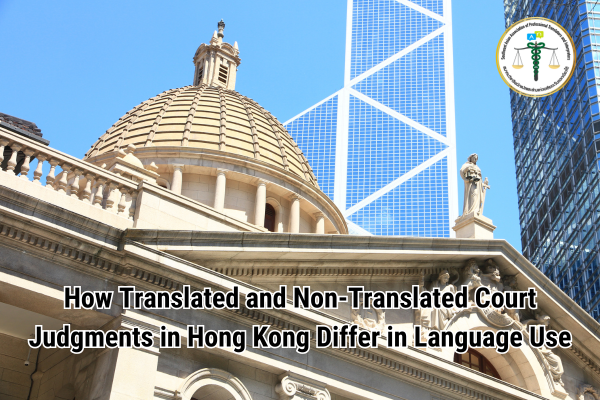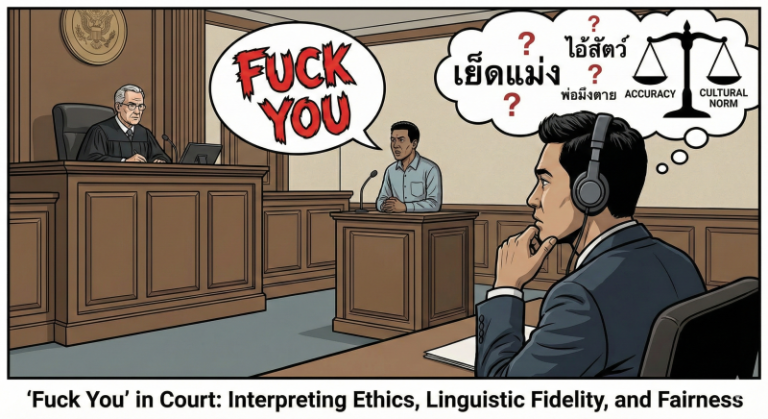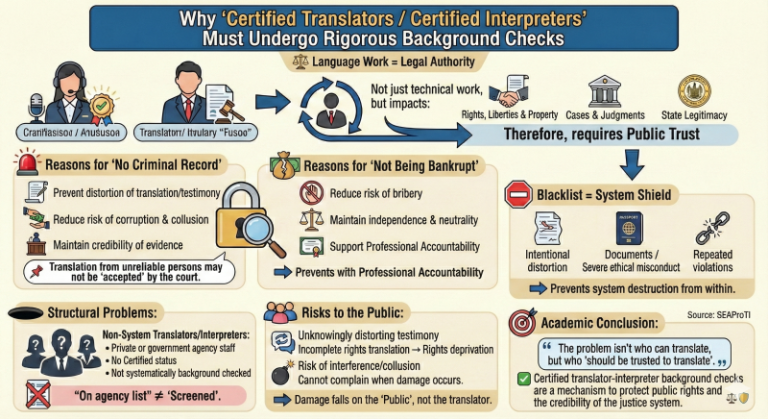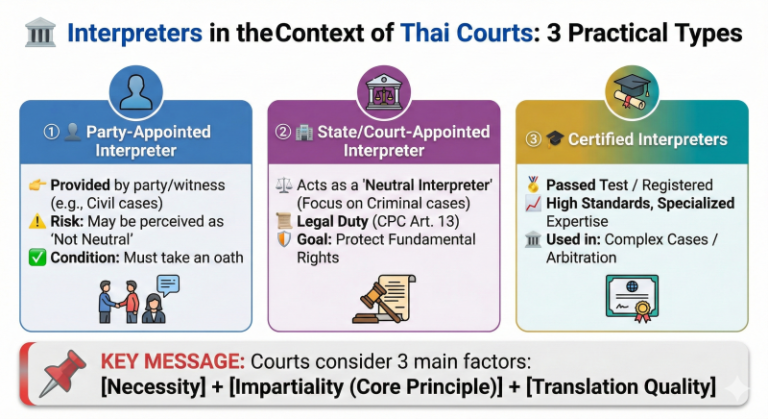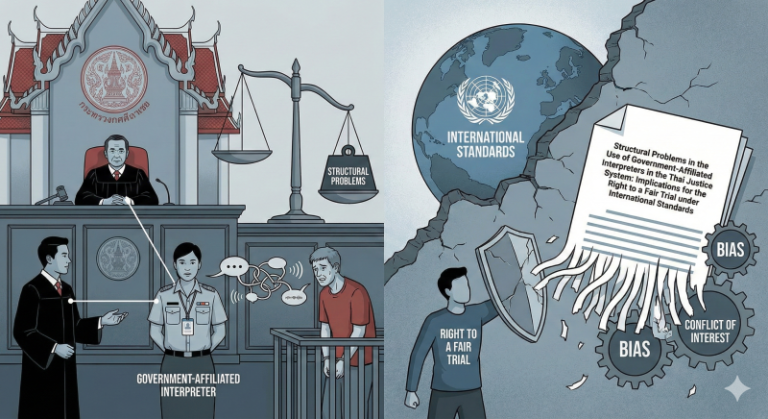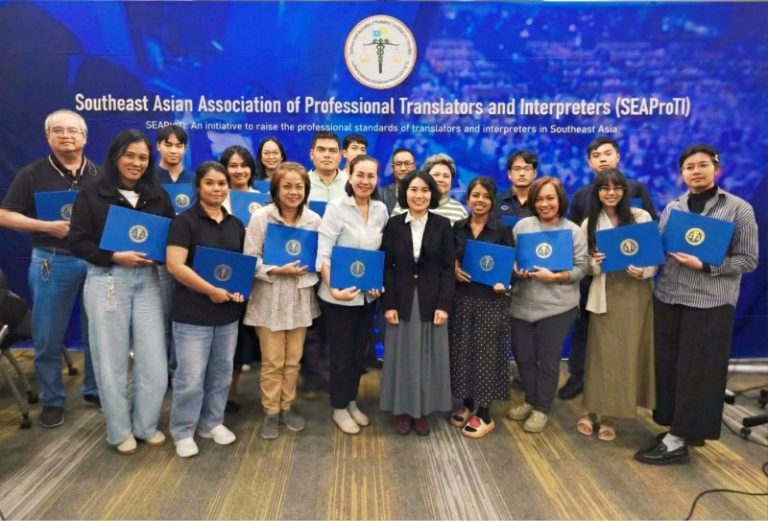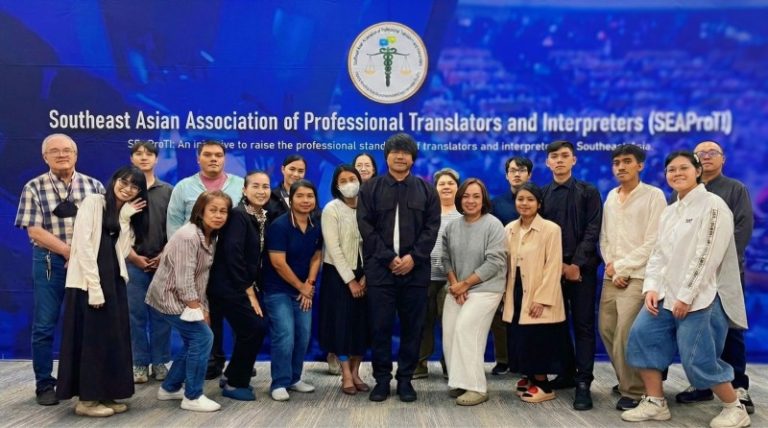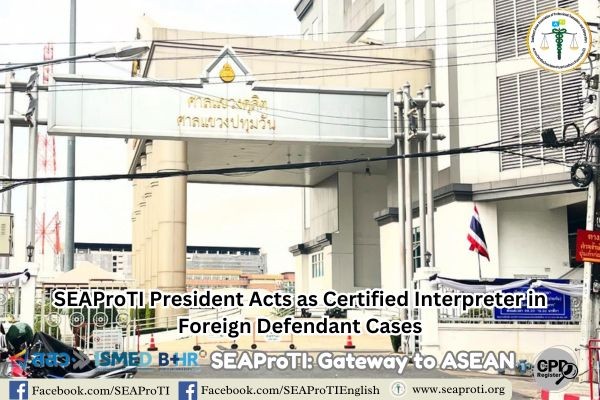The Right to an Interpreter:
Guaranteeing Justice under the European Convention on Human Rights (ECHR)
21 January 2025, Bangkok – The European Convention on Human Rights (ECHR) explicitly establishes the right of foreign defendants who cannot understand or speak the language used in court to receive assistance from an interpreter free of charge, spanning from the arrest process to court proceedings. Thailand, too, is obligated to adhere to this convention.
Governments are responsible for providing competent interpreters to defendants throughout all legal proceedings, from pre-arrest stages such as investigation and charge filing to testimonies and court hearings. This right is a cornerstone in ensuring a fair trial, as enshrined in Article 6 of the Convention.
The role of interpreters provided by the state free of charge is crucial in promoting equality and safeguarding human rights without discrimination.
Who is a Competent Interpreter?
While Thai law does not explicitly define interpreter qualifications under the Convention, the Southeast Asian Association of Professional Translators and Interpreters (SEAProTI) asserts that a competent interpreter is someone with adequate qualifications and skills to accurately, completely, and clearly convey the meaning of speech or documents from one language to another. Especially in legal contexts, a competent interpreter must meet the following criteria:
Language Proficiency
- Possess a profound understanding of both the source and target languages, including legal terminologies and court procedures.
Accuracy and Impartiality
- Able to convey messages or information precisely and without personal interpretation or opinion, ensuring neutrality in the judicial process.
Understanding Legal Processes
- Have foundational knowledge of legal procedures, such as investigations, arrests, and trials, to effectively interpret in relevant contexts.
Confidentiality and Professional Ethics
- Uphold professional ethics, such as maintaining the confidentiality of information received, and perform duties with respect for human rights.
Certification or Credentialing
- In legal contexts, interpreters may need certification from professional associations like SEAProTI or relevant national accrediting bodies to validate their competence.
Under the Convention, governments must ensure that interpreters meet these qualifications, guaranteeing fair and equitable treatment in legal processes.
The European Convention on Human Rights (ECHR)
The European Convention on Human Rights is an international treaty established by the Council of Europe in 1950 to safeguard human rights and fundamental freedoms across Europe. The treaty came into effect on September 3, 1953, and all member states of the Council of Europe have ratified it.
The Convention established the European Court of Human Rights (ECtHR), where individuals can file complaints against state parties if they believe their rights under the Convention have been violated. The Court’s rulings are binding, and states are obligated to comply with its judgments.
The Convention has been supplemented by several protocols, including Protocol No. 15, aimed at improving the efficiency of ECtHR proceedings.
The Role of Interpreters in the Judicial Process
State-provided interpreters play a pivotal role in ensuring justice, particularly for foreign defendants. Their responsibilities include:
-
Accurate Information Transfer
- Acting as a linguistic bridge to ensure that defendants who do not understand the court’s language can accurately and comprehensively access and communicate information at all stages of legal proceedings.
-
Supporting the Right to a Fair Trial
- Ensuring defendants’ rights under Article 6 of the Convention, including the ability to defend themselves effectively in court.
-
Safeguarding Human Rights
- Preventing discrimination against linguistically disadvantaged defendants, enabling their equal participation in legal proceedings.
-
Promoting Equality
- Reducing language barriers, a key factor contributing to potential inequities in trials, especially for foreign or vulnerable defendants.
-
Maintaining Neutrality and Justice
- Performing duties impartially and adhering to professional ethics to prevent misunderstandings or biases affecting trial outcomes.
These roles underline the interpreter’s essential function as a mechanism to ensure equality and protect human rights without discrimination based on ethnicity, language, or legal status.
Can a State Fail to Comply?
States that are parties to the ECHR are legally obligated to comply with its provisions, including providing interpreters to non-native speakers free of charge during judicial processes. Failure to comply could result in:
-
Violation of Legal Obligations
- Non-compliance with Article 6 is considered a breach of the right to a fair trial, actionable in the ECtHR.
-
Litigation and Compensation
- Individuals whose rights have been violated can file complaints with the ECtHR.
- If found guilty, states must compensate the complainants and may need to reform their systems or processes to prevent future violations.
-
Loss of Credibility
- Violating the Convention may harm a state’s international reputation, affecting relations with other Council of Europe member states and leading to political pressure to conform to standards.
-
Monitoring by the Council of Europe’s Committee of Ministers
- The Committee monitors state compliance with ECtHR rulings.
- Non-compliance could result in additional measures, including political sanctions.
-
Undermining Human Rights Domestically
- Non-compliance may lead to widespread human rights violations, eroding public trust in the judiciary and governance.
States party to the ECHR have no discretion to disregard these obligations without consequences. Providing interpreters free of charge is a fundamental duty to uphold justice and human rights within the legal system.
Can Foreign Defendants Provide Their Own Interpreter?
Foreign defendants may hire their own interpreter if they wish. However, this is subject to certain conditions:
-
Court Approval
- The court must approve the chosen interpreter, ensuring they are qualified to prevent errors that could impact the trial.
- The court may review the interpreter’s credentials, such as certifications from professional associations or relevant organizations.
-
Costs
- If defendants hire their own interpreter, they typically bear the costs.
- However, for defendants unable to afford this, the state remains obligated to provide a free interpreter to ensure a fair trial.
-
Professionalism and Neutrality
- The hired interpreter must adhere to professional ethics, such as accurate and impartial interpretation without personal bias.
-
National Laws and Regulations
- Some countries may mandate the use of state-provided interpreters in criminal cases to ensure fairness and minimize conflicts of interest.
While foreign defendants may choose their own interpreters, the interpreters must meet the court’s standards for competence and impartiality. Importantly, the right to a state-appointed interpreter free of charge remains a critical option for defendants who cannot secure one independently.
SEAProTI’s certified translators, translation certification providers, and certified interpreters:
The Southeast Asian Association of Professional Translators and Interpreters (SEAProTI) has officially announced the criteria and qualifications for individuals to register as “Certified Translators,” “Translation Certification Providers,” and “Certified Interpreters” under the association’s regulations. These guidelines are detailed in Sections 9 and 10 of the Royal Thai Government Gazette, issued by the Secretariat of the Cabinet under the Office of the Prime Minister of the Kingdom of Thailand, dated July 25, 2024, Volume 141, Part 66 Ng, Page 100.
To read the full publication, visit: the Royal Thai Government Gazette
สิทธิในการมีล่าม: หลักประกันความยุติธรรมตามอนุสัญญาว่าด้วยสิทธิมนุษยชนแห่งยุโรป (ECHR)
21 มกราคม 2568, กรุงเทพมหานคร – อนุสัญญาว่าด้วยสิทธิมนุษยชนแห่งยุโรป (ECHR) ได้กำหนดไว้อย่างชัดเจนถึง สิทธิของผู้ต้องหาชาวต่างชาติ ที่ไม่สามารถเข้าใจหรือพูดภาษาที่ใช้ในศาลได้ โดยสิทธิดังกล่าวครอบคลุมถึงการได้รับ ความช่วยเหลือจากล่าม โดยไม่เสียค่าใช้จ่ายตั้งแต่ ขั้นตอนการจับกุม ไปจนถึง การพิจารณาคดีในศาล ซึ่งไทยก็ต้องปฏิบัติตามอนุสัญญานี้ด้วยเช่นกัน
รัฐมีหน้าที่ จัดหาล่ามที่มีความสามารถ ให้กับผู้ต้องหาในทุกกระบวนการทางกฎหมาย ตั้งแต่ก่อนการจับกุม เช่น การสอบสวน การตั้งข้อหา การให้ปากคำ และในระหว่างการพิจารณาคดี สิทธินี้ถือเป็นหนึ่งในหลักการสำคัญที่มุ่งมั่นปกป้อง สิทธิในการพิจารณาคดีอย่างเป็นธรรม ตามมาตรา 6 ของอนุสัญญาฯ
บทบาทของล่ามในกระบวนการยุติธรรม ที่รัฐจัดหาให้โดยไม่มีค่าใช้จ่าย ถือเป็นกลไกสำคัญในการส่งเสริมความเท่าเทียมและการปกป้องสิทธิมนุษยชนสำหรับทุกคนโดยไม่เลือกปฏิบัติ
ล่ามที่มีความสามารถ คือใคร
แม้กฎหมายไทยไม่ได้ระบุคุณสมบัติล่ามภายใต้อนุสัญญานี้ แต่สมาคมวิชาชีพนักแปลและล่ามแห่งเอเชียตะวันออกเฉียงใต้ (SEAProTI) มองว่า ล่ามที่มีความสามารถ หมายถึงบุคคลที่มีคุณสมบัติและทักษะเพียงพอในการถ่ายทอดความหมายของคำพูดหรือเอกสารจากภาษาหนึ่งไปยังอีกภาษาหนึ่งอย่างถูกต้อง ครบถ้วน และชัดเจน โดยเฉพาะในบริบททางกฎหมาย ล่ามที่มีความสามารถจะต้องมีคุณสมบัติดังนี้:
ความเชี่ยวชาญในภาษา
- มีความเข้าใจอย่างลึกซึ้งทั้งในภาษาต้นทางและภาษาปลายทาง รวมถึงคำศัพท์เฉพาะทางในกระบวนการยุติธรรม เช่น ศัพท์ทางกฎหมายและขั้นตอนในกระบวนการพิจารณาคดี
ความแม่นยำและเป็นกลาง
- สามารถถ่ายทอดข้อความหรือข้อมูลได้อย่างถูกต้อง ครบถ้วน และปราศจากการตีความหรือแสดงความคิดเห็นส่วนตัว เพื่อรักษาความเป็นกลางในกระบวนการยุติธรรม
ความเข้าใจในกระบวนการยุติธรรม
- มีความรู้พื้นฐานเกี่ยวกับขั้นตอนทางกฎหมาย เช่น การสอบสวน การจับกุม และการพิจารณาคดี เพื่อให้สามารถทำหน้าที่ล่ามได้อย่างเหมาะสมในบริบทของสถานการณ์นั้น ๆ
ความลับและจรรยาบรรณวิชาชีพ
- ยึดมั่นในหลักจรรยาบรรณวิชาชีพ เช่น การรักษาความลับของข้อมูลที่ได้รับ และปฏิบัติหน้าที่โดยคำนึงถึงสิทธิมนุษยชน
การรับรองหรือการรับรองคุณสมบัติ
- ล่ามที่มีความสามารถในบริบททางกฎหมายอาจต้องได้รับการรับรองจากองค์กรหรือสมาคมวิชาชีพ เช่น SEAProTI หรือหน่วยงานที่มีอำนาจรับรองมาตรฐานวิชาชีพในประเทศนั้น ๆ เพื่อยืนยันความสามารถของพวกเขา
ในบริบทของอนุสัญญาฯ รัฐมีหน้าที่ต้องจัดหาล่ามที่มีคุณสมบัติดังกล่าว เพื่อให้มั่นใจว่าผู้ต้องหาจะได้รับการพิจารณาคดีที่เป็นธรรมและมีความเท่าเทียมในกระบวนการทางกฎหมาย
อนุสัญญาว่าด้วยสิทธิมนุษยชนแห่งยุโรป (European Convention on Human Rights – ECHR) เป็นสนธิสัญญาระหว่างประเทศที่จัดทำขึ้นโดยสภายุโรปในปี ค.ศ. 1950 เพื่อปกป้องสิทธิมนุษยชนและเสรีภาพขั้นพื้นฐานในยุโรป อนุสัญญานี้มีผลบังคับใช้เมื่อวันที่ 3 กันยายน ค.ศ. 1953 และรัฐสมาชิกทั้งหมดของสภายุโรปได้ให้สัตยาบันอนุสัญญานี้
อนุสัญญานี้ได้จัดตั้งศาลสิทธิมนุษยชนแห่งยุโรป (European Court of Human Rights – ECtHR) ซึ่งบุคคลที่รู้สึกว่าสิทธิของตนถูกละเมิดภายใต้อนุสัญญาโดยรัฐภาคีสามารถยื่นเรื่องต่อศาลนี้ได้ คำพิพากษาของศาลมีผลผูกพันต่อรัฐที่เกี่ยวข้อง และรัฐเหล่านั้นต้องดำเนินการตามคำพิพากษา
อนุสัญญานี้มีพิธีสารเพิ่มเติมหลายฉบับที่แก้ไขและเพิ่มเติมเนื้อหา หนึ่งในนั้นคือพิธีสารฉบับที่ 15 (Protocol No. 15) ซึ่งมีวัตถุประสงค์เพื่อปรับปรุงกระบวนการของศาลสิทธิมนุษยชนแห่งยุโรปให้มีประสิทธิภาพมากขึ้น
บทบาทของล่ามในกระบวนการยุติธรรม
ล่ามที่รัฐจัดหาให้โดยไม่มีค่าใช้จ่ายในกระบวนการยุติธรรม มีบทบาทสำคัญดังนี้:
-
การถ่ายทอดข้อมูลอย่างถูกต้อง
ล่ามทำหน้าที่เป็นสะพานเชื่อมทางภาษา เพื่อให้ผู้ต้องหาที่ไม่สามารถเข้าใจหรือพูดภาษาที่ใช้ในศาล สามารถรับรู้และสื่อสารข้อมูลได้อย่างถูกต้อง ครบถ้วน และชัดเจนในทุกขั้นตอนของกระบวนการยุติธรรม -
การสนับสนุนสิทธิในการพิจารณาคดีที่เป็นธรรม
การมีล่ามช่วยให้ผู้ต้องหาได้รับการปกป้องสิทธิตามมาตรา 6 ของอนุสัญญาฯ ซึ่งระบุถึงสิทธิในการพิจารณาคดีที่เป็นธรรม รวมถึงความสามารถในการปกป้องตนเองในศาล -
การปกป้องสิทธิมนุษยชน
ล่ามช่วยให้ผู้ต้องหาที่มีข้อจำกัดทางภาษาไม่ถูกเลือกปฏิบัติ และสามารถมีส่วนร่วมในกระบวนการยุติธรรมได้อย่างเท่าเทียม -
ส่งเสริมความเท่าเทียม
ล่ามช่วยลดอุปสรรคทางภาษา ซึ่งเป็นหนึ่งในปัจจัยที่อาจทำให้เกิดความไม่เท่าเทียมในกระบวนการพิจารณาคดี โดยเฉพาะในกรณีของผู้ต้องหาชาวต่างชาติหรือกลุ่มเปราะบาง -
รักษาความเป็นกลางและความยุติธรรมในกระบวนการ
ล่ามทำหน้าที่อย่างเป็นกลาง ไม่แทรกความคิดเห็นส่วนตัว และปฏิบัติตามจรรยาบรรณวิชาชีพ เพื่อให้มั่นใจว่าข้อมูลที่ถ่ายทอดจะไม่ก่อให้เกิดความเข้าใจผิดหรือผลกระทบต่อกระบวนการพิจารณาคดี
บทบาทของล่ามในลักษณะนี้ถือเป็น กลไกสำคัญ ที่ส่งเสริมความเสมอภาคในกระบวนการยุติธรรม และช่วยปกป้องสิทธิมนุษยชนของทุกคนอย่างไม่เลือกปฏิบัติ ไม่ว่าจะมาจากชาติพันธุ์ ภาษา หรือสถานะทางกฎหมายใด ๆ
รัฐไม่ปฏิบัติตามได้หรือไม่
รัฐที่เป็นภาคีของ อนุสัญญาว่าด้วยสิทธิมนุษยชนแห่งยุโรป (ECHR) มี พันธกรณีตามกฎหมายระหว่างประเทศ ที่ต้องปฏิบัติตามข้อกำหนดของอนุสัญญา รวมถึงการจัดหาล่ามให้ผู้ต้องหาที่ไม่สามารถเข้าใจหรือพูดภาษาที่ใช้ในศาลโดยไม่คิดค่าใช้จ่าย หากรัฐไม่ปฏิบัติตาม มีผลกระทบดังนี้:
1. การละเมิดพันธกรณีตามกฎหมาย
หากรัฐไม่จัดหาล่ามให้ตามข้อกำหนดในมาตรา 6 ของ ECHR ถือว่าเป็นการละเมิดสิทธิในการพิจารณาคดีที่เป็นธรรม ซึ่งสามารถถูกฟ้องร้องได้ใน ศาลสิทธิมนุษยชนแห่งยุโรป (ECtHR)
2. การฟ้องร้องและการชดเชย
- บุคคลที่รู้สึกว่าสิทธิของตนถูกละเมิดสามารถยื่นคำร้องต่อ ECtHR ได้
- หากศาลพบว่ารัฐละเมิดสิทธิ จะมีคำพิพากษาให้รัฐ ชดเชยค่าเสียหาย แก่ผู้ร้อง รวมถึงอาจต้องปรับปรุงระบบหรือกระบวนการยุติธรรมเพื่อไม่ให้เกิดการละเมิดซ้ำ
3. ผลกระทบต่อความน่าเชื่อถือของรัฐ
- การละเมิดอนุสัญญาอาจทำให้รัฐเสียความน่าเชื่อถือในเวทีระหว่างประเทศ
- ส่งผลต่อความสัมพันธ์กับประเทศสมาชิกสภายุโรปอื่น ๆ และอาจถูกกดดันให้ปฏิบัติตามมาตรฐาน
4. การเฝ้าระวังจากคณะกรรมการรัฐมนตรีของสภายุโรป
- คณะกรรมการรัฐมนตรีของสภายุโรปมีหน้าที่เฝ้าระวังการดำเนินการตามคำพิพากษาของ ECtHR
- หากรัฐไม่ปฏิบัติตาม อาจถูกพิจารณามาตรการเพิ่มเติม เช่น การคว่ำบาตรทางการเมือง
5. การบั่นทอนสิทธิมนุษยชนภายในประเทศ
- การไม่ปฏิบัติตามพันธกรณีอาจนำไปสู่การละเมิดสิทธิมนุษยชนในวงกว้าง
- สร้างความไม่เชื่อมั่นในระบบยุติธรรมและการปกครองของรัฐ
รัฐที่เป็นภาคี ECHR ไม่มีสิทธิเลือกที่จะไม่ปฏิบัติตาม โดยไม่มีผลกระทบ หากรัฐละเมิดข้อกำหนดดังกล่าว จะต้องเผชิญกับการฟ้องร้อง การชดเชย และแรงกดดันจากนานาชาติ การจัดหาล่ามโดยไม่คิดค่าใช้จ่ายจึงเป็น หน้าที่สำคัญที่รัฐต้องดำเนินการ เพื่อรักษาความยุติธรรมและสิทธิมนุษยชนในระบบยุติธรรม
ผู้ต้องหาชาวต่างชาติสามารถจัดหาล่ามมาเองได้หรือไม่
ในกระบวนการยุติธรรม ผู้ต้องหาชาวต่างชาติ สามารถจัดหาล่ามมาเองได้ หากต้องการ โดยทั่วไปสิ่งนี้ขึ้นอยู่กับเงื่อนไขดังนี้:
1. การยินยอมจากศาล
- ล่ามที่ผู้ต้องหาเลือกมาเองต้องได้รับการยอมรับจากศาลว่า มีความสามารถเพียงพอ ในการทำหน้าที่ล่าม เพื่อป้องกันการแปลผิดพลาดที่อาจกระทบต่อกระบวนการพิจารณาคดี
- ศาลอาจตรวจสอบประวัติ คุณวุฒิ หรือใบรับรองของล่าม เช่น การได้รับการรับรองจากสมาคมวิชาชีพหรือองค์กรที่เกี่ยวข้อง
2. ค่าใช้จ่าย
- หากผู้ต้องหาต้องการใช้ล่ามที่จัดหาเอง อาจต้องรับผิดชอบค่าใช้จ่ายในการจัดหาล่ามนั้นเอง
- อย่างไรก็ตาม หากผู้ต้องหาไม่สามารถแบกรับค่าใช้จ่ายได้ รัฐยังคงมีหน้าที่จัดหาล่ามให้โดยไม่มีค่าใช้จ่าย เพื่อให้มั่นใจว่าผู้ต้องหาได้รับการพิจารณาคดีอย่างเป็นธรรม
3. จรรยาบรรณและความเป็นกลางของล่าม
- ล่ามที่ผู้ต้องหาเลือกต้องปฏิบัติตามจรรยาบรรณวิชาชีพ เช่น การแปลอย่างถูกต้อง ครบถ้วน และเป็นกลาง โดยไม่มีการบิดเบือนข้อมูล
4. กฎหมายและข้อกำหนดของประเทศ
- ในบางประเทศ อาจมีข้อกำหนดทางกฎหมายเกี่ยวกับการใช้ล่ามที่รัฐจัดหาให้เท่านั้นในกรณีทางอาญา เพื่อรับรองความเป็นธรรมและลดความเสี่ยงที่ล่ามอาจมีผลประโยชน์ขัดแย้งกับกระบวนการยุติธรรม
ผู้ต้องหาชาวต่างชาติสามารถหาล่ามมาเองได้ หากล่ามนั้นได้รับการยอมรับจากศาล ว่ามีความสามารถเพียงพอและไม่มีผลกระทบต่อความเป็นธรรมในกระบวนการพิจารณาคดี อย่างไรก็ตาม สิทธิขั้นพื้นฐานในการได้รับล่ามโดยไม่มีค่าใช้จ่ายจากรัฐ จะยังคงเป็นทางเลือกที่สำคัญสำหรับผู้ที่ไม่สามารถจัดหาล่ามเองได้
เกี่ยวกับนักแปลรับรอง ผู้รับรองการแปล และล่ามรับรองของสมาคมวิชาชีพนักแปลและล่ามแห่งเอเชียตะวันออกเฉียงใต้
สมาคมวิชาชีพนักแปลและล่ามแห่งเอเชียตะวันออกเฉียงใต้ (SEAProTI) ได้ประกาศหลักเกณฑ์และคุณสมบัติผู้ที่ขึ้นทะเบียนเป็น “นักแปลรับรอง (Certified Translators) และผู้รับรองการแปล (Translation Certification Providers) และล่ามรับรอง (Certified Interpreters)” ของสมาคม หมวดที่ 9 และหมวดที่ 10 ในราชกิจจานุเบกษา ของสำนักเลขาธิการคณะรัฐมนตรี ในสำนักนายกรัฐมนตรี แห่งราชอาณาจักรไทย ลงวันที่ 25 ก.ค. 2567 เล่มที่ 141 ตอนที่ 66 ง หน้า 100 อ่านฉบับเต็มได้ที่: นักแปลรับรอง ผู้รับรองการแปล และล่ามรับรอง


